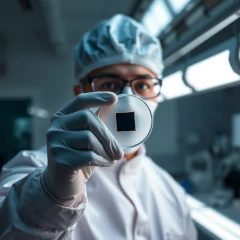OpenAI Teams Up with Broadcom and TSMC for Ambitious AI Chip Project

OpenAI is making significant strides in AI hardware development, partnering with Broadcom and TSMC to create its first custom AI inference chip. The company is also diversifying its chip supply by incorporating AMD processors alongside Nvidia GPUs. With manufacturing set to begin in 2026, OpenAI aims to reduce costs and dependency on a single supplier while pushing the boundaries of AI technology.
In a bold move that could reshape the AI hardware landscape, OpenAI has announced a series of strategic partnerships and initiatives aimed at developing custom AI chips and diversifying its supply chain. The company, known for its cutting-edge AI models including the popular chatGPT, is taking steps to control its technological destiny and manage the massive computing costs associated with advanced AI development.
Custom Chip Development: A New Frontier for OpenAI
OpenAI is venturing into custom chip design, focusing on creating its first AI inference chip. The company has partnered with Broadcom for chip design and secured TSMC for manufacturing, with production expected to begin in 2026. To spearhead this initiative, OpenAI has assembled a team of about 20 engineers, including former Google TPU developers, bringing crucial expertise in Tensor Processing Units to the project.
According to industry analysts, this move aligns OpenAI with strategies employed by other tech giants like Amazon, Meta, Google, and Microsoft, who have also invested in custom chip development. The focus on inference chips is particularly noteworthy, as these components are crucial for deploying AI models in real-world applications.
Previous Ventures in Chip Manufacturing
This is not the first time that OpenAI’s CEO, Sam Altman, has made headlines with ambitious plans in the chip manufacturing space. In February 2024, reports emerged that OpenAI was seeking a staggering $7 trillion from the United Arab Emirates to create its own chip manufacturing plants. This move was seen as an attempt to secure a dedicated supply of AI chips and reduce dependency on existing manufacturers. However, as far as is publicly known, these plans have not materialized. The current partnership with Broadcom and TSMC represents a more measured approach, leveraging existing industry expertise rather than building an entirely new manufacturing infrastructure from the ground up.
Supply Chain Diversification: Balancing Performance and Cost
In a significant shift from its previous reliance on Nvidia GPUs, OpenAI is diversifying its chip supply by incorporating AMD processors. This expansion comes through a partnership with Microsoft’s Azure cloud platform, which will provide OpenAI access to AMD’s new MI300X chips.
Despite this diversification, OpenAI is maintaining its relationship with Nvidia to ensure access to new technologies like the Blackwell chips. This balanced approach allows OpenAI to leverage multiple suppliers while staying at the forefront of AI hardware advancements.
OpenAI’s move towards custom chip development and supply chain diversification appears to be driven by dual objectives. The company seems to be aiming to optimize its AI infrastructure for both performance and cost-efficiency. By developing custom chips and expanding its roster of hardware suppliers, OpenAI is positioning itself to better meet the growing demands of AI research and deployment. This strategy could potentially allow the company to tailor its hardware more closely to its specific needs while also managing costs and reducing dependency on any single supplier.
OpenAI’s recent introduction of reasoning models like o1-preview and o1-mini signals a potential shift in AI computation paradigms. These models are designed to “think” for longer periods during inference time, potentially spending much more computational resources on producing each response. This approach contrasts with traditional models that rely heavily on extensive training but have relatively quick inference times. As a result, the AI industry may see a significant reallocation of computational resources from training to inference. OpenAI’s custom chip development is likely aimed at addressing this evolving need, providing specialized hardware optimized for these longer, more complex inference processes. Such chips could potentially offer improved performance and efficiency for these new types of AI models, supporting extended reasoning capabilities without prohibitive energy or time costs.
Financial Context and Industry Implications
The push for custom chip development and supply diversification comes against a backdrop of significant financial challenges. OpenAI projected a $5 billion loss on $3.7 billion revenue in 2023, with compute costs representing the largest expense. This financial pressure underscores the importance of more efficient, tailored hardware solutions.
OpenAI’s moves could have far-reaching implications for the broader tech sector. As a major consumer of AI chips, the company’s decisions may influence supply, demand, and development trends across the industry. With Nvidia currently holding over 80% of the AI chip market share, OpenAI’s diversification efforts and AMD’s growing presence in the AI chip market could lead to a more competitive landscape.
Future Outlook
OpenAI plans to make its own computer chips by 2026, marking a big change in how it develops AI. Instead of relying only on off-the-shelf hardware by a single vendor (Nvidia), OpenAI will design chips that work best with its AI software. This approach could help OpenAI create more powerful AI systems and possibly come up with new ways to use AI. By making its own chips, OpenAI also aims to stay ahead in the fast-moving and resource-hungry field of AI research and development and to maintain its position as innovation leader.
Sources:
- https://www.theverge.com/2024/10/29/24282843/openai-custom-hardware-amd-nvidia-ai-chips
- https://www.reuters.com/technology/artificial-intelligence/openai-builds-first-chip-with-broadcom-tsmc-scales-back-foundry-ambition-2024-10-29/
- https://moneycheck.com/openai-partners-with-broadcom-and-tsmc-for-custom-chip-development-expands-amd-supply/
- https://www.gurufocus.com/news/2574049/openai-collaborates-with-broadcom-tsmc-and-adds-amd-chips-as-it-diversifies-beyond-nvidia